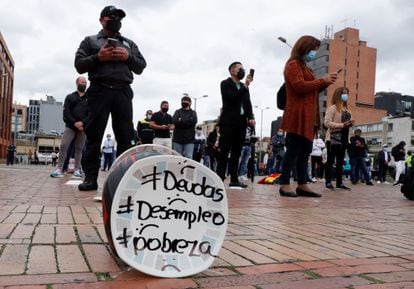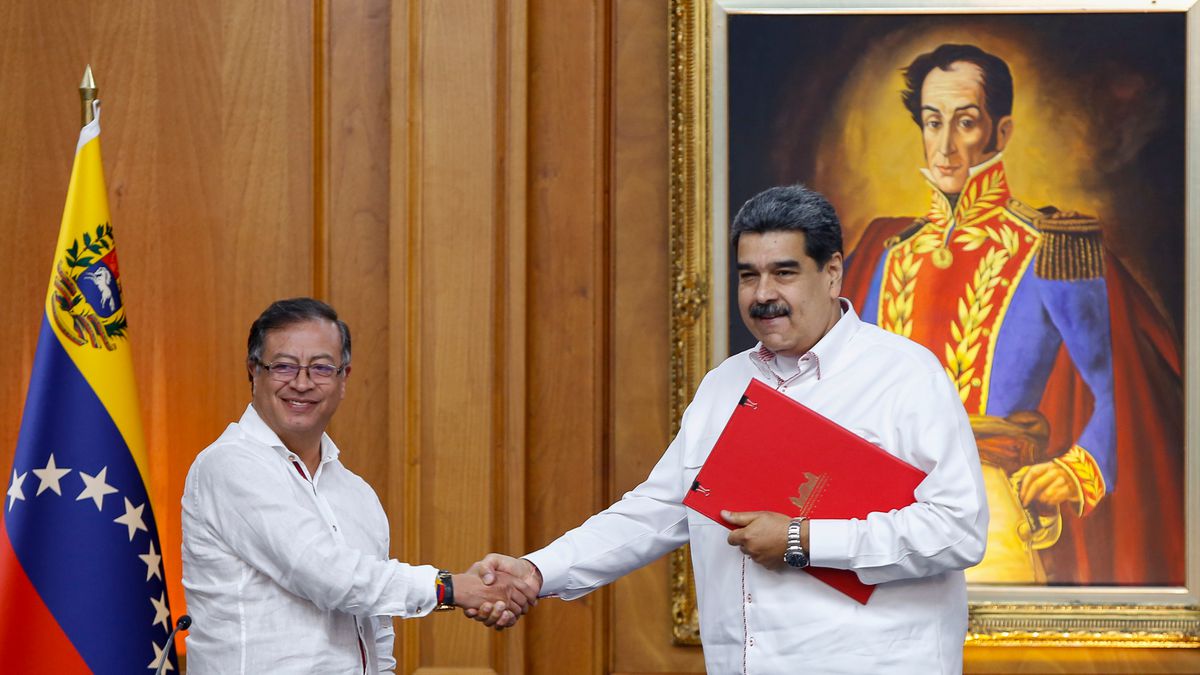A protest by owners of restaurants and bars, in April in Bogotá.Mauricio Duenas Castaneda / EFE
"If you know what the strike was due to, please be a teacher and explain to everyone else that this strike was not only due to the tax reform," begins an anonymous publication that went viral on social networks from Colombia. More than 20 days ago the country erupted in protests and there is no immediate way out right now. The Finance Minister resigned, the proposal to raise taxes was canceled and the violence escalated, mixing with the fed up of citizens who do not want only to get out of the pandemic. They also want to enter the new normal with better job opportunities and quality of life.
The protests this year began with the possibility of a tax reform, but should not be interpreted as new, specialists agree. What happens is that those of 2019 were resumed and many discontent joined in: corruption, the slow implementation of the peace agreements with the former FARC guerrilla, the homicides of peasant and indigenous leaders and, also, inequality and the economic income of families. The pandemic worsened these last two problems and poverty rose from 36% of the population in 2019 to 43% last year.
The situation is, clearly, difficult and for the Government there is one more edge: the stacking of its debt. The president, Iván Duque, sought to increase tax collection by at least the equivalent of 2% of gross domestic product (GDP) so that none of the debt rating agencies would remove Colombia's investment grade. Following the failed attempt, S&P cut the rating on Colombian debt on Wednesday, causing the Colombian peso and the stock market to fall on Thursday. It will be enough for another rating agency to do the same to trigger an outflow of foreign capital, since many funds are only allowed to invest in bonds that have two investment grades.
"We are in an important dilemma as a society," says Carolina Monzón, an economic analyst at Banco Itaú, on the phone from Bogotá.
“In the social contract there are great demands and also in the structural one.
Thinking not only about this very conjunctural front of the pandemic, but also forward, how are we going to attack this debt issue so that it does not continue to grow?
MORE INFORMATION
Iván Duque appoints his vice president as the new chancellor amid external criticism of Colombia
Gustavo Petro joins the protesters in Colombia
Chilean inspiration
Social discontent increased in 2019 and is inspired by the Chilean movement, says Andrés Zambrano, a professor at the Faculty of Economics at the Universidad de los Andes. Chile held elections this month to choose who will write a new constitution. The objective is, among others, to eradicate poverty and alleviate the structural inequality of the country. Colombia is the fourth most unequal country in Latin America and the Caribbean, measured by the Gini coefficient and according to World Bank data.
"Here there is a situation similar to the Chilean one, in the sense that there is a very high inequality, there are some very rich households where the wealth of Colombia is highly concentrated," says Zambrano. "It is a movement made up mainly of middle class families and vulnerable families that have a high unemployment rate. All this dangerous economic cocktail reached a point where people said 'no more,' he explains.
Colombian GDP fell 6.8% last year, as a result of the pandemic.
Despite the fact that about half of the economy works in the informal sector, the government imposed long and strict periods of mandatory confinement, monitored by the police.
Informality increased, along with poverty.
Many families only received the income offered by the Government as part of a social program that sought to help the most vulnerable.
In order for the tax reform to have a greater chance of being accepted by the population, it was offered to make these permanent programs permanent, turning them into a universal basic income unprecedented in the Latin American region.
Devalued middle class
The problem, according to Zambrano, was that an increase in the value added tax (VAT) and the expansion of the taxpayer base were also proposed. Now, only households that earn the equivalent of $ 1,000 a month pay taxes, and the government wanted to lower that floor to $ 700. The former Minister of Finance reported a month ago that the country's average income is 1,100,000 Colombian pesos a month, about $ 300, so taxing those who earn more than that would not technically tax the middle class. What came to uncover this crisis, experts agree, is that the average income does not support a middle class that can cover all its needs.
"Here is a mea culpa of the economists, that we were thinking about the best tax reform, the best tax system, without taking into account the social discontent that existed at this time," says Zambrano. "What we were not taking into account is that distrust that there is towards the Government and the people do not want to give them more money because they perceive it as an unjust Government that does not represent them."
The difference between the minimum wage is highlighted by that post that circulated through the networks, correctly pointing out that the minimum wage is 908,526 pesos, while a congressman earns approximately 34,417,000.
"This strike is not of truck drivers, or of teachers, or of farmers, this strike is of the Colombian people, we are not represented by politicians, or well-off trade unionists, we are represented by the first lines that continue to fight," he reads. the viral text.
Public finances
"Since before the pandemic there was already talk that there were structural issues that had to be solved," says Monzón, "as spending was very inflexible on issues such as health and pensions, for example." When the price of oil exported by the company Ecopetrol, mainly state-owned, was high, the pressures were not so great. But when the price falls and the Government decides to spend the same and finance itself with more debt, the need to collect more taxes is born.
Losing investment grade takes away investor confidence and drives up interest rates.
In other words, it is more expensive for the Government to borrow.
“We all thought that this year was not only going to be the year of the recovery of activity, but that it was also going to bring improvements from the fiscal front.
But [the improvements] are not going to be carried out and we are even experiencing a third wave ”of infections, says the expert.
According to information from
Reuters
, 7.7% of the population has been vaccinated.
Colombia spent 4% of GDP on economic support due to the pandemic, points out Monzón, "we were relatively austere compared to other countries, but still it is not enough for us."
A rising debt
It is estimated that at the end of this year, the cost of debt will be equivalent to 65% of GDP, says Monzón, placing Colombia as one of the most indebted countries in Latin America. "The Government, when presenting its initial tax reform, was telling us that without some adjustments the debt would be close to 100% of GDP in about 10 years," he adds.
Monzón hopes that the new proposal being prepared by the Minister of Finance, José Manuel Restrepo, which seeks to collect more taxes from companies with higher income, will have a place.
Zambrano agrees, but assures that the government's focus must now be on society.
“It is more important, in order to build societies, to address this social discontent.
It is preferable that we concentrate on regaining the confidence of the State than making a reform to fix the country's finances, "says Zambrano," and in that we have failed.
Subscribe here to the
EL PAÍS América
newsletter
and receive all the informative keys of the current situation in the region.









